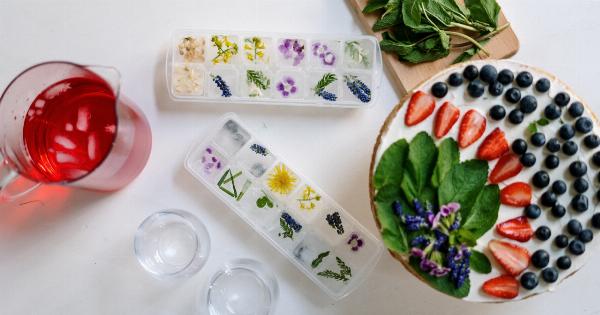Diet plays a crucial role in maintaining overall health and well-being. It not only affects our energy levels and weight but also plays a significant role in protecting our bodies against various health problems, including aging and sun damage.
While it is common knowledge that a balanced diet can help us maintain a healthy weight, it is essential to understand how our dietary choices impact our skin and protect it from the harmful effects of aging and sun exposure.
The Importance of Antioxidants
Antioxidants are substances that neutralize free radicals in the body, which are highly reactive molecules that can damage cells.
These free radicals are often created in our bodies due to exposure to environmental factors such as pollution, chemicals, and UV radiation from the sun. Sunlight, in particular, is a potent source of free radicals that can cause premature aging, wrinkles, and even skin cancer.
By incorporating foods rich in antioxidants into our diet, we can help combat the negative effects of free radicals and protect our skin from aging and sun damage. Some of the most potent antioxidant-rich foods include:.
1. Berries: Blueberries, strawberries, and raspberries are packed with antioxidants, including vitamins C and E, anthocyanins, and polyphenols. These powerful compounds help to protect the skin from damage caused by UV radiation.
2. Dark Leafy Greens: Spinach, kale, and Swiss chard are excellent sources of antioxidants such as vitamins A, C, and E. These nutrients help fight free radicals and prevent premature aging of the skin.
3. Nuts and Seeds: Almonds, walnuts, flaxseeds, and chia seeds are rich in antioxidants and essential fatty acids. They help in maintaining the skin’s elasticity, hydration, and overall health.
Essential Vitamins and Minerals for Skin Health
In addition to antioxidants, certain vitamins and minerals are crucial for maintaining optimal skin health and protecting against aging and sun damage. Including the following nutrients in your diet can help promote healthy, youthful skin:.
1. Vitamin C: This vitamin plays a crucial role in collagen synthesis, which is essential for the skin’s structural integrity. Citrus fruits, bell peppers, tomatoes, and leafy greens are excellent sources of vitamin C.
2. Vitamin E: As a powerful antioxidant, vitamin E protects the skin from oxidative stress caused by free radicals. Nuts, seeds, spinach, and broccoli are rich sources of vitamin E.
3. Zinc: Zinc is involved in collagen synthesis and helps in the repair of damaged tissues. It also has anti-inflammatory effects to soothe sunburned skin. Oysters, nuts, seeds, and legumes are good sources of zinc.
4. Selenium: This mineral helps to maintain skin elasticity and protect against sun damage. Seafood, Brazil nuts, and whole grains are excellent sources of selenium.
5. Omega-3 Fatty Acids: Found in fatty fish like salmon, sardines, and mackerel, omega-3 fatty acids help reduce inflammation caused by sun exposure and support overall skin health.
The Role of Hydration
In addition to a nutrient-rich diet, proper hydration is vital for protecting the skin from aging and sun damage. When the body is dehydrated, the skin becomes dry and less elastic, making it more susceptible to wrinkles and sunburn.
Drinking an adequate amount of water throughout the day helps maintain the skin’s moisture levels, supports its natural protective barriers, and promotes a healthy complexion.
While water is the best choice for hydration, foods with high water content, such as cucumbers, watermelon, and oranges, can also contribute to overall hydration.
Collagen-Boosting Foods
Collagen is the most abundant protein in our bodies and plays a critical role in maintaining the integrity and elasticity of the skin. Unfortunately, as we age, collagen production decreases, leading to the formation of wrinkles and sagging skin.
However, certain foods can help boost collagen production and minimize signs of aging:.
1. Bone Broth: Rich in collagen, consuming bone broth can support the body’s natural collagen production and improve skin elasticity.
2. Citrus Fruits: Apart from being a great source of vitamin C, citrus fruits also contain amino acids crucial for collagen synthesis.
3. Soy Products: Soybeans and soy-based products contain genistein, which helps inhibit enzymes that lead to collagen breakdown.
The Power of Sun-Protective Foods
While a healthy diet can undoubtedly protect the skin from sun damage, it is crucial to note that food cannot replace the need for proper sun protection measures such as sunscreen, protective clothing, and limited sun exposure during peak hours.
However, certain foods have been found to enhance the skin’s natural defenses against the harmful effects of the sun:.
1. Tomatoes: Rich in lycopene, tomatoes can help neutralize the free radicals produced by UV radiation and protect against sunburn.
2. Green Tea: The polyphenols and catechins in green tea have been shown to have a photoprotective effect, reducing skin redness and inflammation caused by the sun.
3. Carrots: Carotenoids, particularly beta-carotene found in carrots, act as a natural sunblock and can help protect the skin from sunburn and UV-induced damage.
The Bottom Line
While there is no magic food that can completely reverse the aging process or shield us from the sun’s harmful rays, following a nutrient-rich diet can certainly contribute to maintaining healthy, youthful-looking skin.
Including antioxidant-rich foods, collagen-boosting foods, and sun-protective foods in our diet can help protect against aging and sun damage. However, it is important to remember that a holistic approach to skin health, which includes proper sun protection measures, adequate hydration, and a well-rounded skincare routine, is essential for maintaining overall skin health.



























